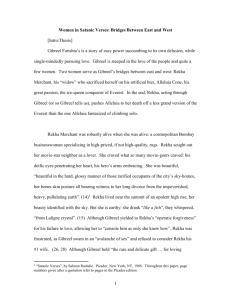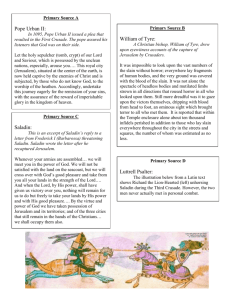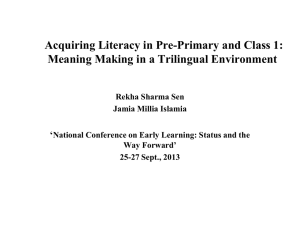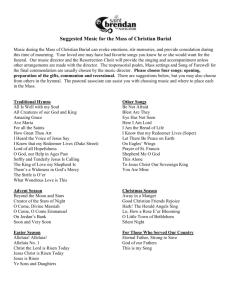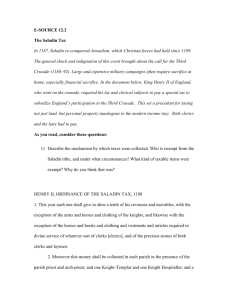Women in Satanic Verses: Bridges Between East and West
advertisement
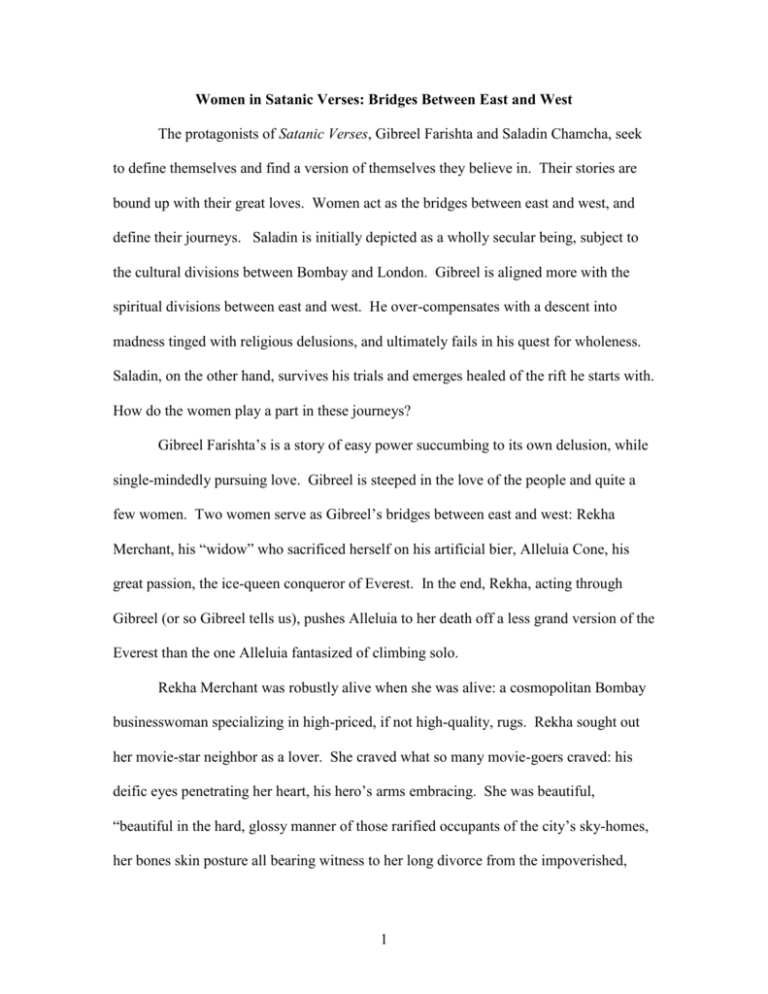
Women in Satanic Verses: Bridges Between East and West The protagonists of Satanic Verses, Gibreel Farishta and Saladin Chamcha, seek to define themselves and find a version of themselves they believe in. Their stories are bound up with their great loves. Women act as the bridges between east and west, and define their journeys. Saladin is initially depicted as a wholly secular being, subject to the cultural divisions between Bombay and London. Gibreel is aligned more with the spiritual divisions between east and west. He over-compensates with a descent into madness tinged with religious delusions, and ultimately fails in his quest for wholeness. Saladin, on the other hand, survives his trials and emerges healed of the rift he starts with. How do the women play a part in these journeys? Gibreel Farishta’s is a story of easy power succumbing to its own delusion, while single-mindedly pursuing love. Gibreel is steeped in the love of the people and quite a few women. Two women serve as Gibreel’s bridges between east and west: Rekha Merchant, his “widow” who sacrificed herself on his artificial bier, Alleluia Cone, his great passion, the ice-queen conqueror of Everest. In the end, Rekha, acting through Gibreel (or so Gibreel tells us), pushes Alleluia to her death off a less grand version of the Everest than the one Alleluia fantasized of climbing solo. Rekha Merchant was robustly alive when she was alive: a cosmopolitan Bombay businesswoman specializing in high-priced, if not high-quality, rugs. Rekha sought out her movie-star neighbor as a lover. She craved what so many movie-goers craved: his deific eyes penetrating her heart, his hero’s arms embracing. She was beautiful, “beautiful in the hard, glossy manner of those rarified occupants of the city’s sky-homes, her bones skin posture all bearing witness to her long divorce from the impoverished, 1 heavy, pullulating earth”. (14)1 Rekha lived near the summit of an opulent high rise, her beauty identified with the sky. But she is earthy: she drank “like a fish”, they whispered, “from Laligne crystal”. (15) Although Gibreel yielded to Rekha’s “operatic forgiveness” for his failure to love, allowing her to “console him as only she knew how”, Rekha was frustrated, as Gibreel swam in an “avalanche of sex” and refused to consider Rekha his #1 wife. (26, 28) Although Gibreel held “the rare and delicate gift … for loving genuinely, deeply and without holding back”, Gibreel became so enamored of his gymnastic nights that he forgot his longing for love. (26) He started hemorrhaging one day for no reason – “quite simply bleeding to death inside his skin”. (28) Rekha, of all Gibreel’s lovers, loved him most, but never visited or phoned or sent “tiffins of delicious home cooking”. (29) Hers was a tough love. Or perhaps, finally Rekha ran up against an obstacle to her love that she could not wear down by threatening and cajoling. She was made powerless and redundant by Gibreel’s turning in on himself. Gibreel called on Allah every moment of his illness. His anger at unjust punishment for unrecognized crimes dissipated as “he realized he was talking to thin air”. (30) Rekha is kept abreast of what happened next – the thunderbolt of Alleluia – and Rekha mocks his “escapade” with “the blond mame” even as Gibreel walks out of Rekha’s earthly life for good. (31) Rekha, scorned, suffered the widow’s fate when Gibreel vanished into thin air. She interpreted a note he left behind (“We are creatures of air, Our roots in dreams And clouds, reborn In flight. Goodbye.”) as a sign that he was dead to her, dead and gone, gone to London after his Alleluia. (13) Her only recourse was to climb one floor up, to the top floor of Everest Vilas, Gibreel’s floor, and leap to her death, taking her children “Satanic Verses”, by Salman Rushdie. Picador, New York, NY, 1988. Throughout this paper, page numbers given after a quotation refer to pages in the Picador edition. 1 2 with her. People whispered that she died broken-hearted and that Gibreel was at fault. Perhaps both Rekha and Gibreel had “the rebirth bug”. (15) After her death, Rekha haunted Gibreel, seeing all, understanding all, cackling and cursing and mocking and prophesying and finally offering herself in any guise for his love. She murmured in Gibreel’s ear as he plummetted through the air in free-fall: “It was you, moon of my delight, who hid behind a cloud; And I in darkness, blinded, lost for love”. (8) Rekha then proceeded to mumble curses in a language he did not understand, but Gibreel catches the name “Al-Lat”. Rekha invoked Al-Lat, the first of the three desert goddesses of Jahilia; Al-Lat, the protagonist of the Koran’s satanic verses, excluded from the recitation by the man dreaming the angel. First the dreamer dreamed Al-Lat to be, then he dreamed her away. A woman cannot overlook these slights. So with the rage of Al-Lat, a spurned woman, Rekha haunted Gibreel through the rest of the story and to his death. After Rekha introduced her carpet-riding self to Gibreel as he fell from 30,000 feet towards the sea, giving him his first intimation of the supernatural forces soon to pervade his life, Rekha found him again when Gibreel finally made it to London in search of Alleluia. She was “[r]etribution on a levitating rug”. (201) Rekha chased Gibreel all day around London, following him on the Underground, appearing in 48-sheet advertising posters, sitting across from him in a train with her carpet rolled up and lying across her knees, hurling accusations and phantoms. Rekha “rubbed up against him from behind in a manner that she would have thought quite outrageous during her lifetime”. (207) Rekha pursued her quarry precisely to recapture him; the haunting is secondary, or, 3 what is love if not haunting? Gibreel, exhausted, gives up all hope only to be saved by another miraculous appearance of his Alleluia. Rekha coincidentally showed up for all of Gibreel’s delusional episodes, his channeling of the Archangel Gabriel. When Gibreel, in a fit of jealous rage, destroyed Alleluia’s nest, he surrendered completely to his archangelic delusions and wandered London, only to be haunted by Rekha mercilessly. She is unsympathetic: Archangel my foot. Gibreel janab, you’re off your head, take it from me. You played too many winged types for your own good. I wouldn’t trust that Deity of yours either, if I were you … He hinted as much himself, fudging the answer to your Oopar-Neechay question like he did. This notion of separation of functions, light versus dark, evil versus good, may be straightforward enough in Islam – O, children of Adam, let not the Devil seduce you, as he expelled your parents from the garden, pulling off from them their clothing that he might show them their shame – but go back a bit and you see that it’s a pretty recent fabrication. (333) Rekha’s lecture on comparative religion “was one of which the ‘real’ Rekha would plainly have been incapable, coming as she did from a polytheistic tradition.” (334) Gibreel knew Rekha was not “real”, but he could not conclude she was entirely a projection of his illness. He clung to the uncomfortable and uncomforting belief that his visions of her were all part of Allah’s plan for his salvation. This Rekha was “an emissary of this God, an external, divine antagonist and not an inner, guilt-produced shade; one sent to wrestle with him and make him whole again”. (335) This Rekha was an accuser, a seductress and temptress (as she had been in life), sent to free him from what the delusional Gibreel now saw as women’s infernal nets. As a child, Gibreel’s mother first planted in her boy’s head that he was special and apart. His first name, Ismail, transmogrified under his mother’s gaze into Gibreel. His last name, Najmuddin, “star of the faith”, was replaced with Farishta, a second 4 identification with the angels. (17) He changed from the sacrifice unto God and the star of faith into the angelic voice of God. It is no wonder he fell prey to delusions: he had background in this business of floating in the air, near to God. It is in this climate of Gibreel’s heightened sense of destiny and self-importance that Rekha both mocked him and tried to pull him back Gibreel banished Rekha by haughtily siding with the Koran: “It’s a trick. There is no God but God. You are neither the Entity nor Its adversary, but only some caterwauling mist.” (346) His vision of Rekha crumbled, melting back into the sky like a bad witch. After this unfortunate second death of Rekha, which this time really was at Gibreel’s hands, or any rate, by the force of Gibreel’s will, Gibreel delusions are sadly Rekha-free. He spirals in increasingly wide circles until finally he invokes Rekha’s spirit to push his Alleluia off the Everest Vilas. In her earthly form, Rekha is (to Gibreel’s mind) just another of the varied pleasures that are his due. Rekha’s worldly status is familiar to women of both east and west; it is in her afterlife that she assumes the fearsome power and magic of the djinn. In this guise, Rekha mocks both Gibreel’s beliefs and delusions. Rekha is a hybrid of east and west: as a businesswoman in a social whirl with a prominent lover, she could be the target of any western scandal rag. It is in her life after death – itself a concept of rebirth associated with the great traditions born in the east – that she becomes a symbol of the east. Mystery, magic, spirit, omniscience, the beyond – Rekha personifies those aspects we stereotypically associate with the east. But as Gibreel tried to flee her and redeem himself, he only slid further into his own exaggerated and distorted mysticism. Rekha tried to pull him back to her. As he rushed headlong to 5 disaster, he pushed her aside to his detriment. If only he heeded her cackling! Rekha could be a bridge to wholeness, and offered Gibreel a way out of his despair: Don’t forget how I was so good at forgiving! You liked it also, na? Therefore I have come to say that compromise solution is always possible. You want to discuss it, or you prefer to go on being lost in this craziness, becoming not an angel but a down-and-out hobo, a stupid joke? (344) Gibreel’s Rekha is the weight of his past, his life in Bombay, the east calling him back with magic and mystery, recrimination and seduction. He chose his own path. If Rekha symbolizes a connection to the east and a bridge to the east, Gibreel is shown to be blind and deaf to the lure of the safe haven of the return home. Alleluia is from the start shown as a hybrid of east and west. She conquered Everest, without oxygen no less, in the style of the sherpas and people on good terms with the mountain. Her first name, Alleluia, derives from the Hebrew for praising God, singing praise unto God, trilling. She grew up in England, but her last name Cone not only ties her in with Mahound’s assignations with the Archangel on the high mountain, but also her Jewish roots, as Cone is an Anglicization of Cohen. Alleluia is a modern woman, but one who walks on knives, like in the fairy tale, to attain her desire. She is reasonable above all, with the exception of her consuming passion for the mountain. Alleluia is practical, self-possessed, poised, ambitious, successful, unmarried, and never submissive. She could be labeled a proper western feminist, independent as she is in her chosen profession that lands her in a competitive male world. Like all western climbers, she relies on technology and progress to aid her ascent of the greatest symbol of the east. She is nothing if not determined and hard-working in the face of pain: “For an hour very evening she would run barefoot up and down the stairs to the street, on her toes, for the sake of her fallen arches.” (323) She has 6 an air of being privy to some great, secret mystery of the universe; also, her quality of what [Saladin] would afterwards think of as wilderness, a hard, sparse thing, anti-social, self-contained, an essence. (442) She meets Gibreel as he enters the world of the unclean pig-eaters, laughing him into reality, and affirming the live-for-today motto of modern society: “You’re alive, that’s what matters.” (31) She repeats this admonition when she discovers him almost passed out in London, having survived the plane breaking up in mid-air, a period of suspended animation and recuperation with an aged widow along the coast, and his first real taste of being haunted by Rekha: “You’re alive … You got your life back. That’s the point.” (208) Gibreel immediately, seemingly without conscious reflection or choice, fell in love with Alleluia. His (partly) reborn self told Rekha, his old mistress of his Bombay past: the moment she turned around and started walking back I fell in love with her. Alleluia Cone, climber of mountains, vanquisher of Everst, blonde yahudan, ice queen. Her challenge, change your life, or did you get it back for nothing, I couldn’t resist. (31) Gibreel and Alleluia spent the next three days (a symbol of how long it takes to move from death to rebirth) in bed, until she flew home to London. Gibreel reassumes his film roles wearing the mantles of the gods, but in a desultory way, until he absconds. His farewell note refers mysteriously to an affinity with the air, he says goodbye to Bombay, and disappears. Gibreel is drawn by the “challenge of [Alleluia], the newness, the fierceness of the two of them together, the inexorability of an impossible thing that was insisting on its right to become”. (32) She is literally both his reason for fleeing to the west and his destination. Alleluia symbolizes for Gibreel both his bridge to the west, and 7 the salvation in the west that he seeks. He wants done with his mumbo-jumbo past, and harem of starry-eyed devotees. He is drawn to Alleluia’s slender, long-legged conquering yet light spirit, “the golden, pale and glacial presence”. (439) Yet Alleluia remains also a symbol of the east Gibreel is trying to leave behind. She too is a creature of the air, inexplicably drawn to the heights that cut her off from her fellow men and women. She lives surrounded by (embedded with?) Everest icons: Long before she ever encountered the mountain, Allie was aware of its brooding presence in her soul. Her apartment was full of Himalayas. Representations of Everest in cork, in plastic, in tile, stone, acrylics, brick jostled for space; there was even one sculpted entirely out of ice, a tiny berg which she kept in the freezer and brought out from time to time to show off to friends. Why so many? Because – no other possible answer – they were there. She holds within her the typical western approach to Everest: conquer it because it is there. Lying curled around Gibreel, Alleluia explains: It’s will that gets you up Everest, will and anger, and it can bend any law of nature you care to mention, at least in the short term, gravity not excluded. If you don’t push your luck, anyway. (318) At the same time, she is greatly susceptible to the mountain’s magic and transcendence, as vouched by her visions when she does summit. She sleeps under “parachute silk [that] formed a canopy of hollowed Himalayas”, as if even during the transporting otherness of the dream world she is protected from falling back to earth, to reality. (311) Her parachute ironically would have come in handy when Gibreel (“Rekha”) pushed her off Everest Vilas. But Gibreel slashed her beautiful protective parachute in his jealous rage when he leaves for the last time. Like Gibreel, Alleluia suffers from hallucinations. She is haunted by the ghost of Maurice Wilson, the legendary solo climber of Everest who 8 never made it back, and who exhorts her to try again, this time alone. Her obsession with impossibly high peak experiences is shared with Gibreel, but Alleluia manages to stay grounded and practical (she simply joins another expedition, and we don’t know if she plans to give in to Maurice Wilson’s siren call). In contrast, Gibreel shoots for transcendence but ends up, in despair, killing Alleluia and taking his own life. He forlornly mourns the tragedy: I didn’t push her Rekha pushed her I wouldn’t have pushed her Spoono Understand me Spoono Bloody hell I loved that girl. Alleluia and Gibreel’s time together is centered on their time in bed. When they meet, the first thing they do is spend three days in bed. When Alleluia rescues Gibreel for the first time from his delusions, he sleeps for a week, and on the seventh day they launched into a “sexual marathon that left them both sore, happy and exhausted when it finally ground to a halt”. (312) Gibreel is frustrated by an ancient male temptation: the desire to possess completely, a fierce jealousy spawned of irrational (if understandable) suspicions. It is Gibreel’s own rhapsodies of sex with Alleluia that fuel Saladin’s taunting telephonic limericks. Saladin, forced to endure descriptions in “embarrassing detail [of] the carnal ecstasy of sharing Allie’s bed”, realizes “what all this sex talk revealed was the weakness of their so-called grand passion – a term which Allie had only half-jokingly employed – because, in a phrase, there was nothing else about it that was any good; there was simply no other aspect of their togetherness to rhapsodize about.” (452) By regaling Saladin with tales of intimacies with Allie, Gibreel plays a huge part 9 in doing himself in, but Gibreel sees no explanation other than to judge Alleluia. In this we can see a judgement of tradition: the suspicions of woman’s power that the west often ascribes to the east. Rekha and Alleluia both live in the heights and plunge to death from the heights. In Rekha’s case, her suicide is whispered to be Gibreel’s fault, and in Alleluia’s case, we have Gibreel’s own confession. Both women (and perhaps all women who desire Gibreel) deliquesce into him, melting into the air with him. Alleluia is ice transforming into land: An iceberg is water striving to be land; a mountain, especially a Himalaya, especially Everest, is land’s attempt to metamorphose into sky; it is grounded flight, the earth mutated – nearly – into air, and become, in the true sense, exalted. (313) Both women are mountains dissolving into air. It may be a stretch, but these transformations can be seen as east mingling with west, transformations in both directions, with women as agents. Saladin’s story is one of wilderness tamed. He is a stranger wandering in the wilderness of London, straining for entry into what he imagines is the warm, enlightened, settled, happy ideal of the west. He is both abruptly (due to a sudden fall from grace) and gradually (due to a prolonged and painful transformation to devil and back) brought home to Bombay. Saladin is married to “culture, city, wife; and a fourth and final love, of which he had spoken to nobody: the love of a dream”. (414) On a trip to Bombay to visit his aging father, before time runs out, he enjoys a brief but highly satisfying affair with a brilliantly light-hearted and illuminating woman from his Bombay past, Zeenat. The memory of his time with her affords him some material for fantasies during the interminable days of 10 waiting out the hijacking that precedes his literal and abrupt fall. Within days, he is transfigured into a grotesque realization of the devil, hair, hoofs, horns, stink and all, and rejected by that same culture, city, wife, and dream. The two women who act as bridges in Saladin’s story are Pamela Lovelace, his totem English wife, and Zeenat Vakil, his past and future love from the home of his childhood. Pamela is the ultimate English trophy for Saladin. His image of her – “frail as porcelain, graceful as gazelles” – was perhaps at odds with her aggressive and assertive personality, but she symbolized England, and he pursued her for five and a half years. (60) Acquiring Pamela had everything to do with acquiring Englishness. He needed someone to believe in his transformation to a proper western man: “A man who invents himself needs someone to believe in him, to prove he’s managed it … Not only the need to be believed in, but to believe in another.” (50) Pamela’s voice more than any other part of her established her as paragon of England: Pamela Chamcha, neé Lovelace, was the possessor of a voice for which, in many ways, the rest of her life had been an effort to compensate. It was a voice composed of tweeds, headscarves, summer pudding, hockey-sticks, thatched houses, saddle-soap, house-parties, nuns, family pews, large dogs and philistinism, and in spite of all her attempts to reduce its volume it was loud as dinner-jacketed drunk throwing bread rolls in a Club. It had been the tragedy of her younger days that thanks to this voice she had been endlessly pursued by the gentlemen farmers and debs’ delights and somethings in the city whom she despised with all her heart, while the greenies and peacemarchers and world-changers with whom she instinctively felt at home treated her with deep suspicion, bordering on resentment. (186) She decided finally to end her marriage to Saladin when she realized he was not in love with her at all, but with her voice “stinking of Yorkshire pudding and hearts of oak”. (186) Saladin desperately sought to marry England, and just as desperately, Pamela sought to flee from England. She defiantly married an Indian to annoy her parents and 11 make a point. But “it had been a marriage of crossed purposes, each of them rushing towards the very thing from which the other was in flight”. (186) Pamela devoted herself to working with the downtrodden, especially the brown and the black, compensating for her upper-class background. If Saladin used Pamela as his way into England, she is equally guilty of trying to use him as her way out. Pamela did not turn out to be a proper wife, English or otherwise. When Saladin is arrested for the crime of sprouting horns and hoofs, he waited in vain for his wife to fetch him, redeem him, pledge for him. When Pamela heard that he plane he was on broke up over the Atlantic at 30,000 feet, she took this excuse to start drinking heavily, and pounced on Jumpy Joshi, a friend of twenty years, when he showed up to console her for her loss. Far from mourning, she took Jumpy as a lover, to convince herself that after all the years of being forced to play-act “bloody Brittania”, she was “really real” after all. (181) Scared witless by Joshi’s insistence that her dead husband phoned in the middle of the night, she pampered herself with a very old-money weekend in the country. That night, in an oak-panelled dining-room decorated with medieval flags, Pamela Chamcha in her most dazzling gown ate venison and drank a bottle of Château Talbot at a table heavy with silver and crystal, celebrating a new beginning, an escape from the jaws of, a fresh start, to be born again first you have to: well, almost, anyway. Under the lascivious eyes of Americans and salesmen she ate and drank alone, retiring early to a princess’s bedroom in a stone tower to take a long bath and watch old movies on television. In the aftermath of her brush with death she felt the past dropping away from her … (188) Pamela’s only regret at her husband’s misfortune is that he died before she had the chance to make good on her decision to kick him out and get a divorce. When Chamcha as hairy goat showed up at their house, she kicked him back to his people. When Chamcha returned home at long last, restored to human form, Pamela was forced to let 12 him into his own house, but refused to have anything to do with him, and was exasperated at her lover’s insistence on treating Saladin gingerly as a returned hero to whom only awe is due. Her refusal to play the role of good wife was rooted in the reality of their relationship. Lying in bed, not knowing exactly if her husband is dead or alive, but choosing to believe he’s dead, She thought of the last thing she needed to tell her late husband. ‘In bed,’ the words came, ‘you never seemed interested in me; not in my pleasure, what I needed, not really ever. I came to think you wanted, not a lover. A servant.’ There. Now rest in peace. Saladin was desperate to believe in his manufactured fetish. The spell was broken when fate set him on a course that eventually led back to India. Saladin exerted heroic force of will in his attempt to make Pamela his permanent link to the west he revered, and he only slowly abandoned the idea she would soften and take him back after his transformation. Like Rekha and Alleluia, Zeenat Vakil is a hybrid of east and west. She is a “rash, bad girl”. (52) She is educated, intellectual, sophisticated, politically active, modern; the author of a book on the confining myths of authenticity, “The Only Good Indian”. Zeeny included the Mughal influence and presence in India in her representations: “was not the entire national culture based on the principle of borrowing whatever clothes seemed to fit, Aryan, Mughal, British, take-the-best-and-leave-therest?” (52) A modern woman who paid attention to none of the traditional Mughal prohibitions on women existing apart from their husbands (let alone carrying on in bed with men who are not their husbands), she and Saladin romped in bed and clearly enjoyed it without having to try so hard. Zeeny mocked Saladin’s inauthenticity; in fact, this is 13 her primary role in the entire story. It is Zeeny who held up a mirror to Saladin, challenging him to see Bombay and himself for what they are. Zeeny tells him: I want to slap you. To sting you back into life. But I also get sad about it. Such a fool, you, the big star whose face is the wrong colour for their colour TVs, who has to travel to wogland with some two-bit company, playing the babu part on top of it, just to get into a play. They kick you around and still you stay, you love them, bloody slave mentality, I swear. (62) She all but implored him to give up his western foolishness and return to his roots. “Salad baba, whatever you call yourself, for Pete’s sake come home.” (62) She asks him to make Bombay’s faults his own: If you’re serious about shaking off your foreignness, Salad baba, then don’t fall into some kind of rootless limbo instead. Okay? We’re all here. We’re right in front of you. You really should try and make an adult acquaintance with this place, this time. Try and embrace this city, as it is, not some childhood memory that makes you both nostalgic and sick. Draw it close. The actually existing place. Make its faults your own. Become its creature; belong. (555) Zeeny is a challenge to Saladin, refusing ultimately to choose sides in his struggle between new and old. She tried to show him what she regarded as a better way, but knew any change has to be Saladin’s own choice. Saladin asked her: “You think I’ll stay with you? I’m a married man.” Zeeny did not hesitate: “ ‘I didn’t want you to stay for me,’ she said. ‘For some reason, I wanted it for you.’ ” (73) From time to time Zeeny emphatically underscored her roots. For example, “Zeenat Vakil walked up to the old man in his outsize suit, put her hands on his cheeks, and kissed him on the lips”, shocking Saladin with this endorsement of his father’s regression into an ultra-traditional past. His father had compensated for the loss of his wife by absorbing a beloved servant into what can be seen as the master’s harem, the master’s prerogative. The acceptance of this or 14 submission to this by the woman and her husband reinforces the ancient, tribal nature of his compensation. And Zeeny, to everyone’s surprise, endorsed it. Zeeny’s modern persona shines through her solid identification with Bombay. She does not know shame – she epitomizes free, emancipated woman: “ ‘You say I should be ashamed’, Chamcha said bitterly to Zeenat. ‘You, who are without shame. As a matter of fact, this may be a national characteristic. I begin to suspect that Indians lack the necessary moral refinement for a true sense of tragedy, and therefore cannot really understand the idea of shame.’ “ (73) But Saladin recognizes Zeeny’s true nature and its appeal: “He thought, at times, of Zeeny Vakil on that other planet, Bombay, at the far rim of the galaxy: Zeeny, eclectisim, hybridity.” (297) She serves as the bridge for Saladin to return to the east. His warm memories of their happy time, mutually accepting, sustain him during his imprisonment in the horrific form of the devil. In addition to the nubile teenager caring for him in the attic of the Shandaar Café, Zeeny is the other woman who started haunting his dreams, “whom he left in Bombay with the knife of his departure sticking in her heart, and who must still think him dead – Zeeny Vakil”. (423) Zeeny is also Saladin’s destination, his yearning for love, which he dimly recognizes as his wife’s Pamela’s initial appeal. At the end, when Saladin returns to take care of his father on his deathbed, he finally has a chance to rub the magic lamp his father gave him, then took away, and then gave again. Waiting for him when he returned from the graveyard: a copperand-brass lamp, his renewed inheritance. He went into Changez’s study and closed the door. … He took the lamp from its shelf and sat at Changez’s desk. Taking a handkerchief from his pocket, he rubbed briskly: once, twice, thrice. The lights went on at once. Zeenat Vakil entered the room. 15 Gibreel uses Alleluia as a bridge to London, away from his movie star and loverboy life, looking for true love, but devolving into delusion. Rekha’s ghost clings to his conscious and subconscious, but he cannot avail himself of her path back to his roots any more than he can avail himself of the chance to renew himself in the west with Alleluia. He kills himself and Alleluia, and is held liable for Rekha’s death, fairly or not. His thrust is away from the east, and towards the west; this journey ends in disaster. Saladin spends his life trying to marry himself to the west, using Pamela as a foil, but his devilish transformation opens his eyes to the painful reality that the west rejects him, refusing to see him for who he is. He is open to the bridge back home exemplified by Zeeny, and this journey leads to a happy ending; the two of them walk off into the sunset, a successful mingling of the best of east and west. Gibreel’s path is taken to emptiness; Saladin’s, to wholeness. Of the four women and the journeys they symbolize, Zeeny is the clear winner. She alone emerges happy, stable, at peace, whole, and not incidentally, with her man. Rushdie celebrates hybridization in all the love relationships he depicts, but the one most rooted in “the best” of the east is the one that triumphs. 16
